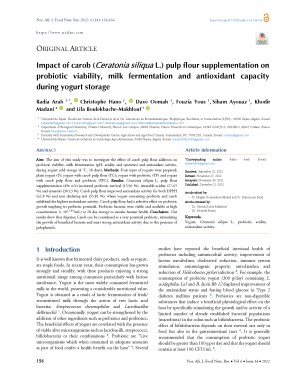Main Article Content
Impact of carob (Ceratonia Ciliqua L) pulp flour supplementation on probiotic viability, milk fermentation and antioxidant capacity during yogurt storage
Abstract
In this study, we evaluated the effect of carob pulp flour addition on probiotic viability, milk fermentation and antioxidant activity during yogurt storage (4 °C, 28 days). Four types of yogurts were prepared: plain yogurt (Y); yogurt with carob pulp flour (YC); yogurt with probiotic (YP) and yogurt with carob pulp flour and probiotic (YPC). Ceratonia siliqua pulp flour supplementation (4% w/v) increased probiotic survival, titratable acidity, syneresis and phenolics. Antioxidant activity also increased for both DPPH and iron chelating test in the presence of carob and probiotic, where yogurt containing probiotic and carob exhibited the highest antioxidant activity. Carob pulp flour had a selective effect on probiotic growth implying its prebiotic potential. Probiotic bacteria were viable and available at high concentration (> 106cfu/mL) at 28 day storage to sustain human health. Our results show that cheap Algerian carob can be used in probiotic formulation of functional foods with health benefits since it enhances the phenolic content and providing antioxidant potential of yogurt.







